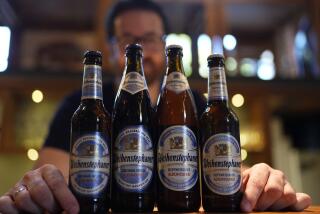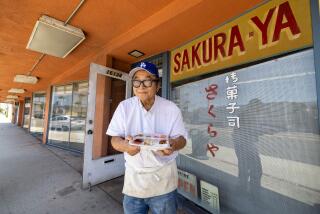THE PACIFIC : Big Headaches for Brewers With Small Dreams : Japan: Pub owners who want to make their own suds blame bureaucrats for keeping a ‘local beer’ revolution out of reach.
- Share via
TOKYO — Nobuhisa Iwamoto has everything he needs to start Japan’s first brew pub: shiny new equipment, training in the beer brewing arts and a cozy restaurant in a good location.
Everything, that is, except a license to make the stuff.
A government move April 1 to loosen rigid regulations on beer making has raised hopes for a jibiiru , or local beer, revolution by making it easier for smaller breweries to get a license. But Iwamoto’s 25-seat pub--like countless others--is too small.
“Unless they relax the rules more, it’s still going to be tough to make money as a microbrewer,” he says.
Critics say the limited change in brewing regulations reflects the reluctance of Japan’s elite bureaucrats to loosen their grip on the economy and may bode ill for other areas of economic deregulation set in motion by former Prime Minister Morihiro Hosokawa.
“We’re still slaves to the bureaucrats,” says Iwamoto’s father, Mitsuo, who owns the pub. It is named Sankt Gallen after the ancient St. Gall monastery in Switzerland, where the oldest written records of beer brewing were found.
In Japan, the old law requiring brewers to produce at least 2 million liters per year in effect limited the market to a few huge companies, which tend to put out similar products.
That limit was slashed to 60,000 liters a year, the same as for brewers of Japanese sake, or rice wine.
But that’s still a lot of suds.
In order to make enough beer to get a license, a bar would have to sell 164 liters of beer a day, or about 300 pint-size mugs. That’s about six times more than Iwamoto can serve in his restaurant.
So for now, Iwamoto confines his brewing to beer with 1% alcohol, which is allowed under the law. He also serves bottles of regular beer, with about 5% alcohol, made at his father’s brew pub in San Francisco and brought in as an import.
The possibility of an explosion in microbrewing similar to that in the United States has captured popular interest here far more than the relatively mundane deregulation issues such as banking and trucking.
Microbrewing took off in the United States after the industry was liberalized in 1979. Today about 350 small breweries and brew pubs offer an alternative to mainstream labels.
The Japanese Finance Ministry says the government’s tough brewing controls are needed to ensure profitability for the brewers and, thus, a steady flow of beer taxes.
At 45% per bottle, tax revenues from beer amount to about $14 billion a year.
But several industry experts agree with brewing consultant Yotaro Yanase.
“The government, as usual, has been protecting large companies and doesn’t want to let new ones in,” he says.
Nonetheless, there are many signs of growing interest in local beers, which some aficionados see as a way to reject Japan’s mass-market culture.
“I’m optimistic,” Yanase says. “There is great potential.”
Even if deregulation does produce Japan’s first independent breweries since the 1950s, it may be some time before small brew masters such as Iwamoto get their chance.
Smiling as he serves up a sample of his latest creation--a medium-bodied, fruity amber ale accented with cascade hops--Iwamoto, 31, says he’s glad he’s still young.
“Things take such a long time to change here,” he says. “I’ll just have to wait.”
More to Read
Sign up for Essential California
The most important California stories and recommendations in your inbox every morning.
You may occasionally receive promotional content from the Los Angeles Times.













